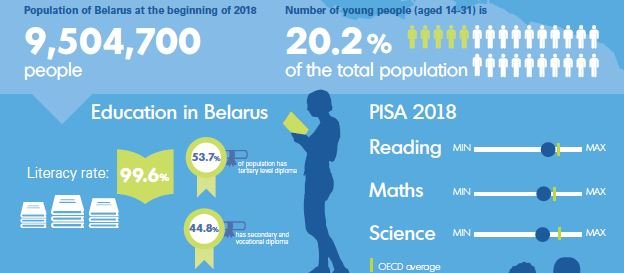
Belarus should boost the quality, efficiency and equity of VET
Increasing the quality, efficiency and equity of vocational education and training (VET) in meeting the needs of the economy is a key recommendation in the European Training Foundation’s assessment of Belarus’ human capital development policies. Priority actions in this area include using regional resource centres to promote vocational excellence, modernising teacher training and optimising regional VET provider networks.
Carried out as part of the Torino Process – a periodic appraisal of the state of development of each country’s skills development and labour market systems – the ETF assessment also recommends, amongst other things, addressing the skills needs of small and medium-sized enterprises in order to promote SME growth and private sector development; and addressing regional disparities in competitiveness through entrepreneurship education and targeted support to regional economic ecosystems.
These recommendations aim to support Belarus’ government in addressing a series of economic and social challenges including low private sector growth, regional disparities, low value added by the SME sector, a shrinking working age population and skills shortages and gaps. The negative image of vocational education and training means the supply of university graduates exceeds the number of graduate jobs in the economy. As a result, many graduates work in non-graduate positions, while employers report skills shortages in intermediate level occupations. Unemployment among university graduates is currently higher than among people with secondary level VET qualifications.
Published following an extensive process of data collection and consultation with a wide range of stakeholders in the country, the report provides an external, forward-looking analysis of Belarus’ human capital issues and vocational education and training policies from a lifelong learning perspective. It identifies challenges related to education and training policy and practices that hinder the development and use of human capital. It takes stock of these challenges and offers recommendations for possible solutions.
The ETF’s assessment of Belarus will be discussed, together with those of the other Eastern Partnership countries, at a regional event to be held online on 16 and 17 September 2020.
These assessments are central to the Torino Process, an initiative launched by the ETF in 2010 with the aim of providing periodic reviews of VET practises in the wider context of human capital development and inclusive economic growth. In order to make a high-quality assessment of VET policy from a lifelong learning perspective, the process builds on four key principles: ownership, participation, holistic analysis, and evidence-based analysis.
As part of this process, Belarus produced its own national report, which is available on the Open Space knowledge sharing platform.
Did you like this article? If you would like to be notified when new content like this is published, subscribe to receive our email alerts.